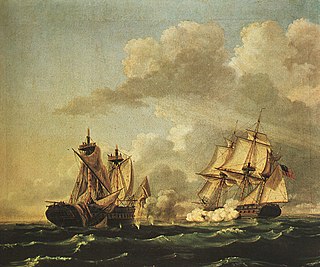Commodore is a senior naval rank used in many navies which is equivalent to brigadier or brigadier general and air commodore. It is superior to a navy captain, but below a rear admiral. It is either regarded as the most junior of the flag officers rank or may not hold the jurisdiction of a flag officer at all depending on the officer's appointment. Non-English-speaking nations commonly use the rank of flotilla admiral, counter admiral, or senior captain as an equivalent, although counter admiral may also correspond to rear admiral lower half abbreviated as RDML.

Military ranks are a system of hierarchical relationships, within armed forces, police, intelligence agencies or other institutions organized along military lines. The military rank system defines dominance, authority, and responsibility in a military hierarchy. It incorporates the principles of exercising power and authority into the military chain of command—the succession of commanders superior to subordinates through which command is exercised. The military chain of command constructs an important component for organized collective action.

HMS Macedonian was a 38-gun fifth-rate Lively-class frigate in the Royal Navy, later captured by the USS United States during the War of 1812.

The Royal Naval Reserve (RNR) is one of the two volunteer reserve forces of the Royal Navy in the United Kingdom. Together with the Royal Marines Reserve, they form the Maritime Reserve. The present RNR was formed by merging the original Royal Naval Reserve, created in 1859, and the Royal Naval Volunteer Reserve (RNVR), created in 1903. The Royal Naval Reserve has seen action in World War I, World War II, the Iraq War, and War in Afghanistan.

David Porter was an officer in the United States Navy in the rank of captain and the honorary title of commodore. Porter commanded a number of U.S. naval ships. He saw service in the First Barbary War, the War of 1812 and in the West Indies. On July 2, 1812, Porter hoisted the banner "Free trade and sailors' rights" as captain of USS Essex. The phrase resonated with many Americans. Porter was later court martialed; he resigned and then joined and became commander-in-chief of the Mexican Navy. Porter County, Indiana was named after him.
Flotilla admiral is the lowest flag rank, a rank above captain, in the modern navies of Belgium, Bulgaria, Denmark, Finland, Germany and Sweden. It corresponds to the rank of commodore in the navies of the United Kingdom and certain other countries or rear admiral in the navy of the United States.
Captain lieutenant or captain-lieutenant is a military rank, used in a number of navies worldwide and formerly in the British Army.

A broad pennant is a triangular swallow-tailed naval pennant flown from the masthead of a warship afloat or a naval headquarters ashore to indicate the presence of either:
Senior captain is a rank which is used in some countries' armed forces, navies, merchant marines, civil aviation and in the airline industry.
Commodore (Cdre) is a rank of the Royal Navy above captain and below rear admiral. It has a NATO ranking code of OF-6. The rank is equivalent to brigadier in the British Army and Royal Marines and to air commodore in the Royal Air Force. Commodore has only been a substantive rank in the Royal Navy since 1997. Until then the term denoted a functional position rather than a formal rank, being the title bestowed on the senior officer of a fleet of at least two naval vessels comprising an independent command.
Commodore was an early title and later a rank in the United States Navy, United States Coast Guard and the Confederate States Navy, and also has been a rank in the United States Public Health Service Commissioned Corps and the National Oceanic and Atmospheric Administration Commissioned Officer Corps and its ancestor organizations. For over two centuries, the designation has been given varying levels of authority and formality.

David Dixon Porter was a United States Navy admiral and a member of one of the most distinguished families in the history of the U.S. Navy. Promoted as the second U.S. Navy officer ever to attain the rank of admiral, after his adoptive brother David G. Farragut, Porter helped improve the Navy as the Superintendent of the U.S. Naval Academy after significant service in the American Civil War.

Convoy commodore also known as commodore, convoys was the title of a civilian put in charge of the good order of the merchant ships in the British convoys used during World War II. Usually the convoy commodore was a retired naval officer or a senior merchant captain drawn from the Royal Naval Reserve. He was aboard one of the merchant ships. The convoy commodore was distinguished from the commander of the convoy's escort, always a naval officer.

Captain is the name most often given in English-speaking navies to the rank corresponding to command of the largest ships. The rank is equal to the army rank of colonel and air force rank of group captain.
Brigadier (Brig) is a senior rank in the British Army and the Royal Marines. Brigadier is the superior rank to colonel, and subordinate to major-general. It corresponds to the rank of brigadier general in many other nations.

A rear admiral in the uniformed services of the United States is either of two different ranks of commissioned officers: one-star flag officers and two-star flag officers. By contrast, in most other countries, the term "rear admiral" refers only to an officer of two-star rank.
Navy Captain Joseph Abulu was the first Military Administrator of Anambra State in Nigeria from 27 August 1991 to 1 January 1992 after the Enugu State had been split from the old Anambra during the military regime of General Ibrahim Babangida.
Rear-Admiral Rashid Ahmed was a two-star rank admiral in the Pakistan Navy, who is known for serving as Chief of Staff under Commander in Chief Vice-Admiral Muzaffar Hassan and led the Navy during the fateful events in the war with India in 1971.







